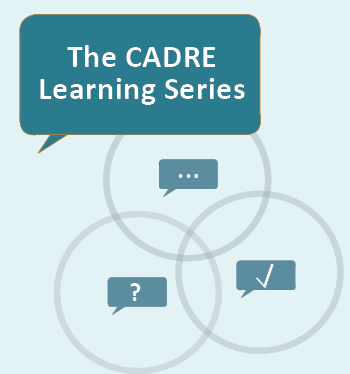
The CADRE Learning Series includes webinars with people sharing experience and expertise combined with opportunities for dialog during consultations. Stay tuned for the next topic!
Topics:
- AI in STEM Education Research (May 2024 - January 2025)
- Rural Partnerships (January - February 2024)
- Instructional Observation (September - November 2023)
- Partnerships in Research (March 2023)
- Using Video in Education Research (January - February 2023)
- Designing Case Study Research (September - October 2022)
- Professional Development for Researchers Who Don't Study PD (March - May 2022)
AI in STEM Education Research
View a series of webinars on AI in STEM Education Research.
Generative AI in STEM Teaching and Learning: Now and in the Future | January 2025
The January webinar on Generative AI in STEM Teaching and Learning: Now and in the Future, brought together authors of two briefs: Generative AI in STEM Teaching: Opportunities and Tradeoffs and The Potential of Using AI to Improve Student Learning in STEM: Now and in the Future. The authors shared an overview of the briefs, respondents Roy Pea and Ebony Terrell Shockley gave additional context and questions for the field, and the panelists engaged in a discussion in response to webinar participants' question about AI in STEM education.
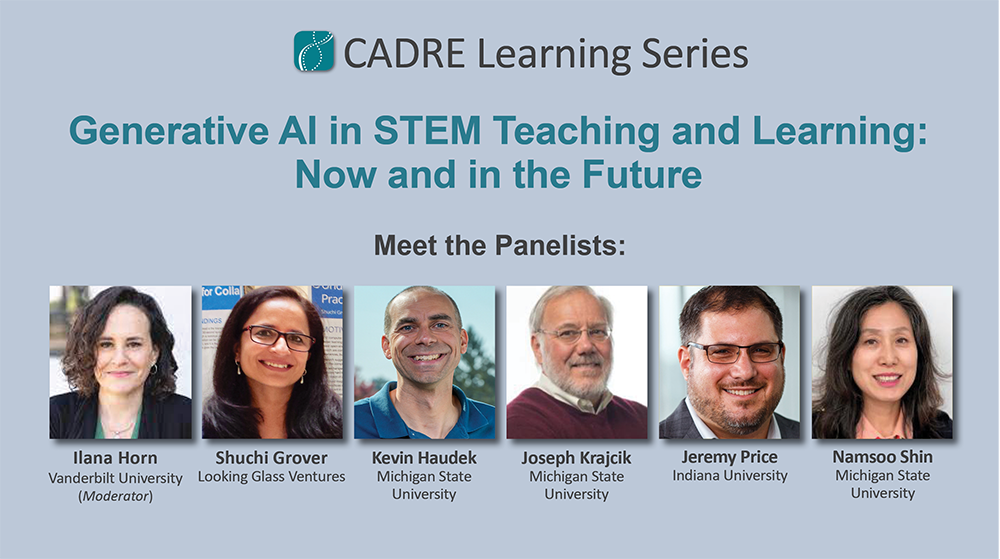 Moderator: Ilana Horn, Vanderbilt University. Panelists: Shuchi Grover, Looking Glass Ventures; Kevin Haudek, Michigan State University; Joseph Krajcik, Michigan State University; Jeremy F. Price Indiana University Indianapolis; and Namsoo Shin, Michigan State University. Respondents: Roy Pea, Stanford University; Ebony Terrell Shockley, University of Maryland College Park
Moderator: Ilana Horn, Vanderbilt University. Panelists: Shuchi Grover, Looking Glass Ventures; Kevin Haudek, Michigan State University; Joseph Krajcik, Michigan State University; Jeremy F. Price Indiana University Indianapolis; and Namsoo Shin, Michigan State University. Respondents: Roy Pea, Stanford University; Ebony Terrell Shockley, University of Maryland College Park
Webinar Resources:
- View the recording
- Slides: Intro AIED Learning Series (Ilana Horn, Christopher Harris) | Generative AI in STEM Teaching Overview (Jeremy F. Price, Shuchi Grover) | The Potential of Using AI to Improve Student Learning Overview (Namsoo Shin, Kevin Haudek) | Response to the Potential of Using AI to Improve Student Learning (Roy Pea)
Ethical Use of AI in STEM Education Research | May 2024
Rapid advances in artificial intelligence (AI) have changed the role of AI in education research. How do we navigate these changes ethically in our research and proposal writing? What questions should we be considering as education researchers? We discussed these questions and more with the authors of the brief titled Toward Ethical and Just AI in Education Research in a May Learning Series webinar.
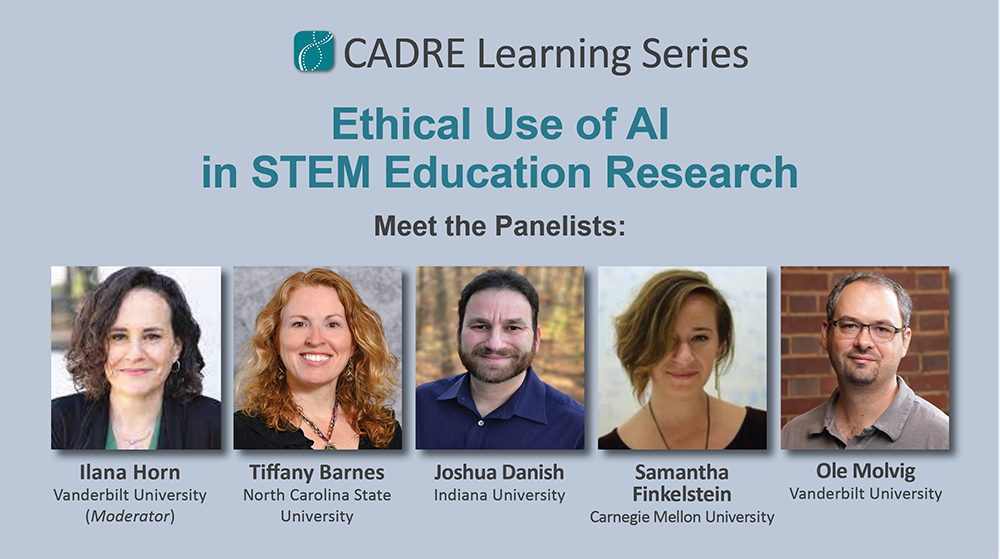 Moderator: Ilana Horn, Vanderbilt University
Moderator: Ilana Horn, Vanderbilt University
Panelists: Tiffany Barnes, North Carolina State University; Joshua Danish, Indiana University; Samantha Finkelstein, Carnegie Mellon University; and Ole Molvig, Vanderbilt University
Webinar Resources:
Rural Partnerships
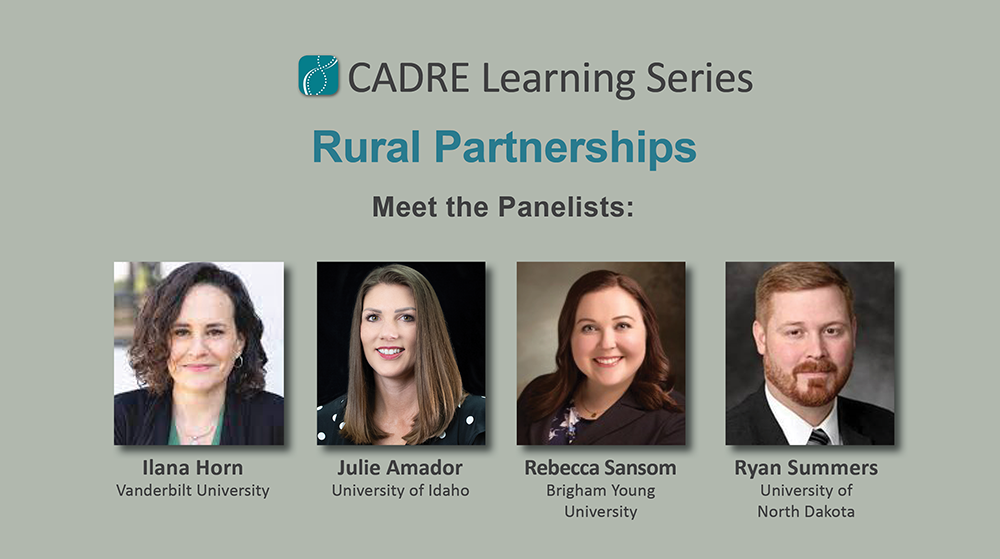 Recognizing the unique assets and needs of rural education, DRK-12 researchers are working in partnerships with rural communities across the U.S. to support STEM education. In Part 1 of this Learning Series, researchers shared their approaches to working in rural settings and creating mutually beneficial partnerships. They highlighted both affordances and challenges to working with rural schools and offered strategies to keep in mind when building a research plan and budget. Following the panel webinar on January 24, we will have small-group consultations on February 13, where participants can consult with the presenters to get feedback on their own partnership work (current or potential) in rural settings.
Recognizing the unique assets and needs of rural education, DRK-12 researchers are working in partnerships with rural communities across the U.S. to support STEM education. In Part 1 of this Learning Series, researchers shared their approaches to working in rural settings and creating mutually beneficial partnerships. They highlighted both affordances and challenges to working with rural schools and offered strategies to keep in mind when building a research plan and budget. Following the panel webinar on January 24, we will have small-group consultations on February 13, where participants can consult with the presenters to get feedback on their own partnership work (current or potential) in rural settings.
- Part 1 Panel | Wednesday, January 24, 2024, 12:30 – 2 PM ET
Moderator: Ilana Horn, Vanderbilt University; Panelists: Julie Amador, University of Idaho; Rebecca Sansom, Brigham Young University; Ryan Summers, University of North Dakota- Webinar Resources:
- Recording
- Slides: Intro (Horn) | Amador | Sansom | Summers
- Webinar Resources:
- Part 2 Consultations | Tuesday, February 13, 2024, 12:30 – 2 PM ET
Consultants: Julie Amador, University of Idaho; Rebecca Sansom, Brigham Young University; Ryan Summers, University of North Dakota- Consultation Topics:
- Building partnerships (e.g., Identifying potential partners, building a network of state and regional offices and organizations, communicating with partners, recruiting participants, using an asset-based approaches to working in rural communities, identifying the existing strengths of teachers and students and schools, understanding the microcultures that exist within communities and how we can leverage them)
- Proposal preparation (e.g., Proposal preparation, ways of describing partnerships, illustrating connections between entities, and communicating rural environments to readers, proposal writing with partners, getting initial letters of interest)
- Consultation Topics:
Instructional Observation
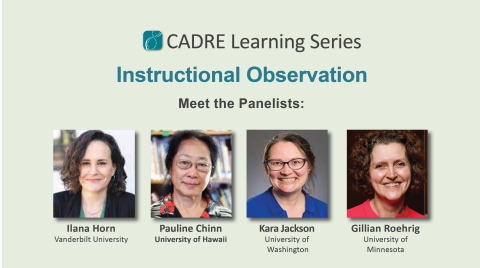
Many DRK-12 projects seek to document changes in classroom instruction. To that end, researchers often seek to use or create reliable instructional observation instruments. In Part 1 of this Learning Series webinar, we will hear from researchers who have used or designed these tools in their DRK-12 research. Participants will learn about a range of tools, their various uses and limitations, in the hopes of generating ideas for other project designs. Following the webinar on September 28, we will have a follow-up webinar on November 9, where participants can consult with the presenting researchers to get feedback on their own research designs.
- Part 1 Panel | September 28, 2023, 11:30 AM - 1 PM ET
Moderator: Ilana Horn, Vanderbilt University; Panelists: Pauline Chinn, University of Hawaii; Kara Jackson, University of Washington; Gillian Roehrig, University of Minnesota
Webinar Resources:- Recording
- Slides: Intro (Horn) | Roehrig | Jackson | Chinn
- Part 2 Consultations | November 9, 2023, 3 - 4 PM ET
Consultants: Pauline Chinn, University of Hawaii; Ilana Horn, Vanderbilt University; Kara Jackson, University of Washington; Gillian Roehrig, University of Minnesota
Partnerships in Research
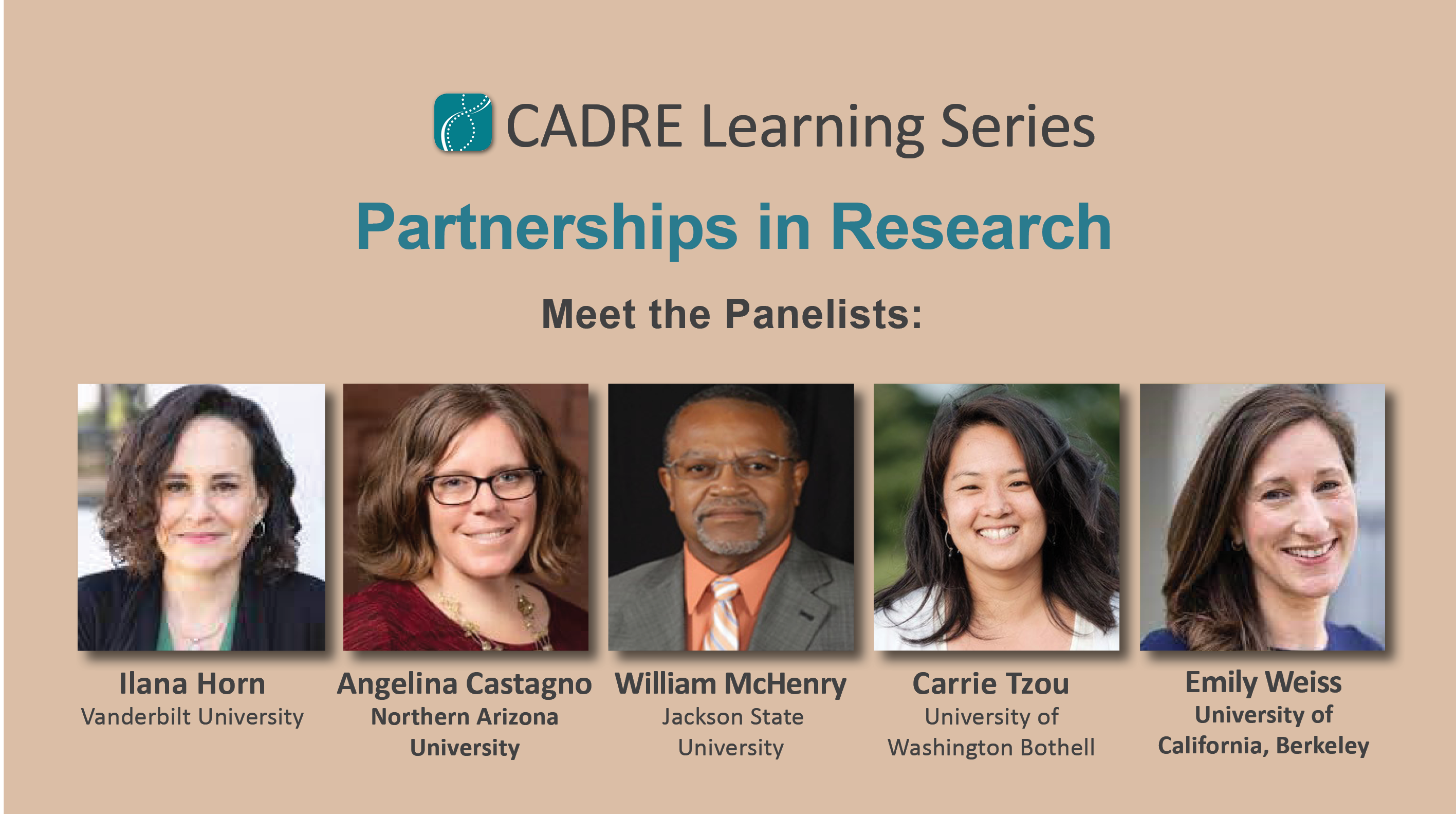
Developing and maintaining partnerships is a necessary component of education research. During Part 1 of this webinar series, learn how researchers are approaching partnerships with teachers, schools, districts, and others. In Part 2, join the panelists for small group consultations to discuss issues and opportunities that have arisen in your own research partnerships.
- Part 1 | March 7, 11:30AM—1 PM ET
Moderator: Ilana Horn, Vanderbilt University; Panelists: Angelina Castagno, Northern Arizona University; William McHenry, Jackson State University; Emily Weiss, University of California, Berkeley- Webinar Resources:
- Part 1 webinar recording
- Part 1 slides (in presentation order): Intro | Emily Weiss | William McHenry | Angelina Castagno | Ilana Horn
- Resource List (panelists' slides, resources, and advice for developing and maintaining partnerships in research)
- Webinar Resources:
- Part 2 | March 28, 11:30AM—1 PM ET
Consultants: Angelina Castagno, Northern Arizona University; Ilana Horn, Vanderbilt University; Carrie Tzou, University of Washington Bothell; Emily Weiss, University of California, Berkeley
Using Video in Education Research
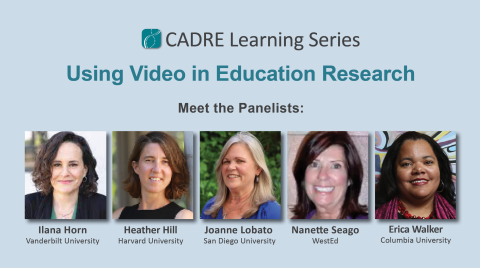
Do you want to introduce video approaches into your research or figure out new strategies for recording and analyzing video data?
In the first webinar of this Learning Series on January 27, researchers shared how they incorporate video into their studies for a range of purposes and at different scales.
In the follow-up session on February 10, participants had the opportunity to discuss design ideas for their own studies, joining smaller consultation groups on the following topics:
- Developing public-facing videos
- Working with large video data sets
- Turning classroom video data into PD materials
- Studying participant responses to video materials
- Capturing students and teachers together with video
Learning Series Resources:
- Part 1 webinar recording and slides (in presentation order): Ilana Horn | Erica Walker | Joanne Lobato | Nanette Seago | Heather Hill
- Resource list
Moderator: Ilana Horn, Vanderbilt University
Panelists: Heather Hill, Harvard University; Joanne Lobato, San Diego State University; Nanette Seago, WestEd; Erica Walker, Columbia University
Designing Case Study Research
The CADRE Learning Series event, “Designing Case Study Research” include two parts. During the first webinar, panelists addressed the questions: How do you situate your case study research to explain the phenomena you are studying at different phases of your work? What are some core strategies you might share? During the second webinar, small groups discussed topics, questions, and issues raised during the first webinar.
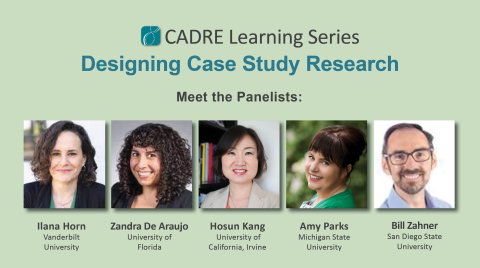 Learning Series Resources:
Learning Series Resources:
- Notes and Resources from Part 1 and 2
- Part 1: Webinar | September 12, 2022
- Webinar Recording
- Slides: Ilana Horn | Hosun Kang | Amy Parks | Bill Zahner | Zandra de Araujo
- Part 2: Webinar | October 24, 2022
Moderator: Ilana Horn, Vanderbilt University (bio)
Panelists: Zandra De Araujo, University of Florida (bio) | Hosun Kang, University of California, Irvine (bio) | Amy Parks, Michigan State University (bio) | Bill Zahner, San Diego State University (bio)
Professional Development for Researchers Who Don’t Study PD
Are you incorporating a professional development (PD) component into your non-PD DRK-12 project or proposal (i.e., it’s not the primary focus and your team may have different expertise)? Register for this free webinar series to learn from and work with expert colleagues on PD design.
In this three part CADRE Learning Series, participants had an opportunity to refine the designs for the professional development (PD) components of their DRK12 projects or proposals. In the first interactive webinar, our expert panelists shared important design principles for PD. After the webinar, participants had an opportunity to consult with panelists about specific issues in their PD designs. In a follow up webinar, the panelists shared what they learned from their design consultations, sharing how they applied (or modified) the design principles to address the investigators’ needs and resources.
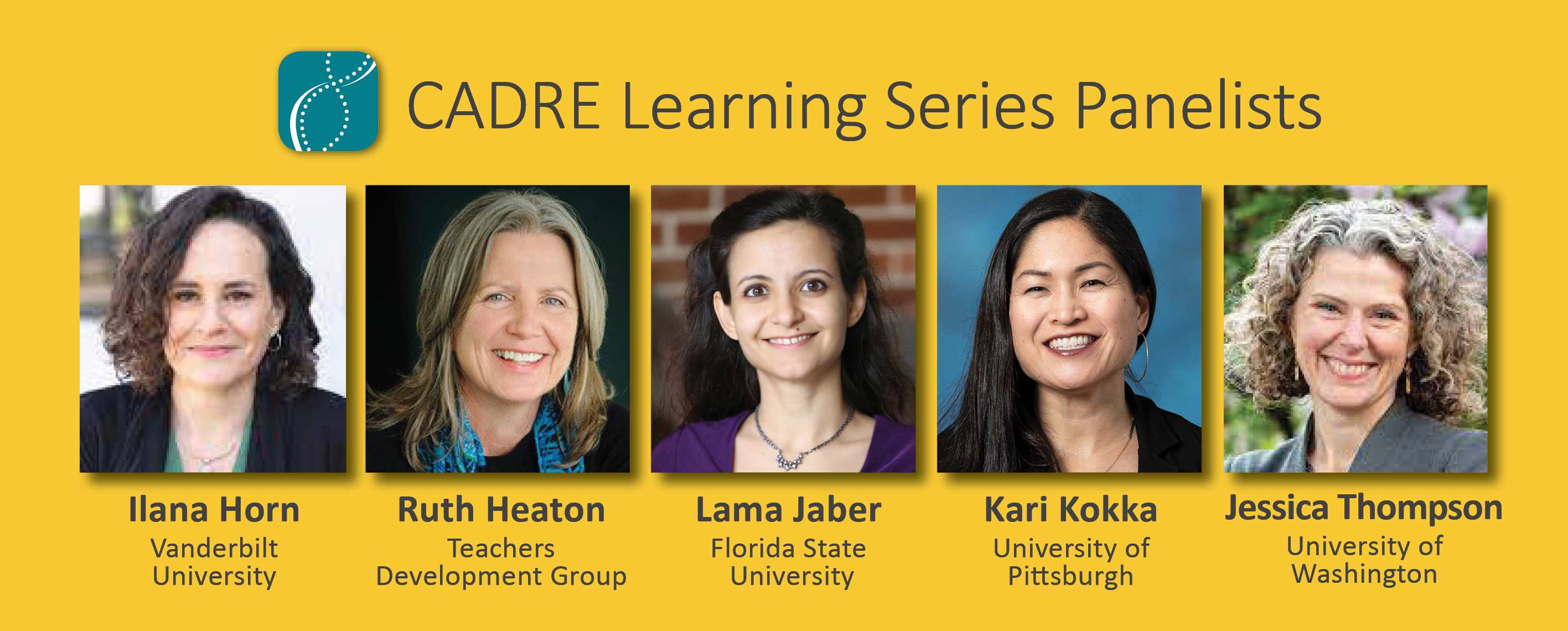 Learning Series Resources:
Learning Series Resources:
- Part 1: Webinar | March 22, 2022
- Part 2: Consultations | April 8-14, 2022
- Part 3: Webinar | May 3, 2022
- Webinar recording
- Slides: Ruth Heaton | Ilana Horn | Lama Jaber | Kari Kokka | Jessica Thompson
- Resource List
Moderator: Ilana Horn, Vanderbilt University (bio)
Panelists: Ruth Heaton, Teachers Development Group (bio); Lama Ziad Jaber, Florida State University (bio); Kari Kokka, University of Pittsburgh (bio); Jessica Thompson, University of Washington (bio)